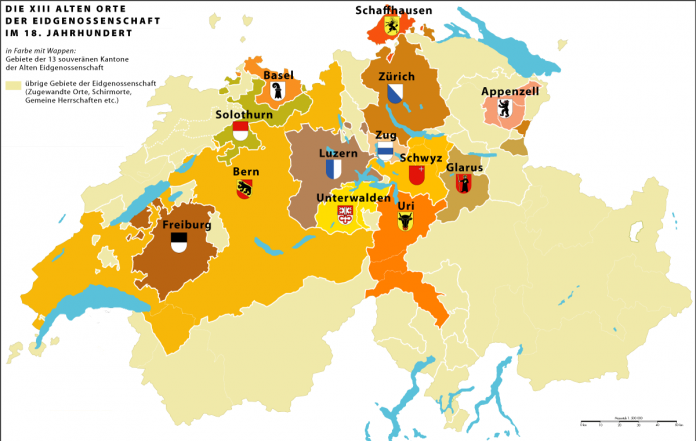
By Jamie Whyte, a London-based writer, formerly the Leader of ACT, a classical-liberal political party in New Zealand.
In The Wealth of Nations, Adam Smith observed that “people of the same trade seldom meet together, even for merriment and diversion, but the conversation ends in a conspiracy against the public, or in some contrivance to raise prices”.
The trade of government is no exception. Taxation is the price we pay for what governments provide. And they sometimes get together in a conspiracy to raise this price. European politicians are especially keen on it. Unlike commercial tradesmen, they don’t conceal it. On the contrary, they proudly declare their desire to “harmonise” taxes. Who could oppose harmony?!
Me, for one. And everyone else should too. We get low prices only when there is no harmony between businesses – only, that is, when they must compete for customers. The same goes for governments.
That’s why taxes are unusually low in Switzerland. Federal taxes make up a small portion of the total collected, with most being raised by the cantons. A Swiss can reduce his tax bill by moving to a canton that charges lower rates. Taxes are low in Switzerland because cantons compete for citizen-customers. European Union politicians and bureaucrats should abandon their corrupt dream of tax harmonization and, instead, go Swiss.
National governments should be allowed to collect no more than 10 per cent of GDP
You may think they already have. After all, any EU citizen can live in any EU country. If a Frenchman doesn’t like French taxes, he can move to Estonia, for one example out of 26. But moving from France to Estonia is costly. You end up too far from your old friends and family to see them at the weekend. You lose your business contacts. You can’t get snails for dinner. And you may not speak Estonian.
“Free movement” within the EU is a legal fact, not an economic one. Moving home between EU countries remains expensive – much more expensive than moving between Swiss cantons. If our Frenchman could change the tax regime he lives under by moving from Paris to Versailles, then the hypothetical Parisian and Versailles tax-setters would face a genuine market constraint that actual French tax-setters do not.
To make this possible for our Frenchman, and for all other EU citizens, national governments should be allowed to collect no more than 10 per cent of GDP, with all other tax collection devolved to the administrative regions two down from the national governments – in Germany, the districts (Keise) rather than the states (Länder); in France, the departments rather than the regions; and so on in each country. Following this rule should be a condition of EU membership.
If tax competition between small localities is such a good idea, why do I suggest allowing national governments to tax up to 10 percent of GDP? Because competition is not the only virtue in the structure of tax regimes. We also want the scope of tax collection to overlap as closely as possible with the scope of the public goods it supplies.
Suppose I buy and eat a ham sandwich. I get all the benefit of it. But if I buy a nuclear missile and threaten to retaliate if anyone sends one of theirs my way, then it is not only me who benefits from this deterrence but everyone in a radius of hundreds of kilometres of me. When it comes to nukes, that is what counts as “coming my way”. Whereas a ham sandwich is a private good because only the purchaser benefits from it, nuclear deterrence is a public good because everyone benefits, whether or not they paid for it.
Of course, a public good does not really benefit everyone. The Chinese do not benefit from the deterrence provided by the UK’s nuclear arsenal. They are too far away. The residents of Berlin do not benefit from street lights in Munich. Public goods have a geographic scope. And those who live within that scope, and therefore get the benefit of the public good, should fund it.
Why? Because, when they don’t, too much or too little will be spent on public goods. The Oxford police force provides safety only to the people of Oxford. However, the taxes that fund them are raised nationally, and the amount spent is decided by the national government. But maybe the people of Oxford would prefer lower taxes and more crime. Or maybe higher taxes and less crime. Local democratic decision-making will reflect local preferences better than national democratic decision-making will. Which is another virtue of fragmenting tax collection. (National government’s get to keep some tax collecting powers because some public goods are closer to national in scope.)
Politically impossible?
The proposal will strike many readers as politically impossible, since it could be adopted only with the support of national governments. And that is a turkeys-voting-for-Christmas proposal. Why would a national politician want to diminish his power, and his ability to use tax revenues to buy votes, by devolving tax-and-spend authority to districts?
Many won’t, of course. But some European politicians might see it as a way of solving a problem they face.
National politicians are often accused of living in an elite metropolitan bubble, with no understanding of the concerns of those who live in the provinces. Where regional populations have an independent “identity”, as in Scotland and Catalonia, separatist movements are thriving.
National politicians are thus in competition with regional politicians. But not with district politicians. Lombardy politicians might plausibly campaign to become an independent country (in league with some of their Northern Italian neighbours, perhaps). Milanese politicians could not.
By devolving tax-and-spend powers to districts, national politicians would render regional governments largely irrelevant. Separatist politicians could not complain about the burdens placed on them by the aloof national elite.
It would also help to defuse tensions between the EU and its member states. If the “deal” Europeans got depended not on their nation but on the district they live in, “taking back control” would no longer be an argument for national withdrawal. People who can move between small tax-raising districts and vote in them would already have more control than nationalist separatists could offer them.
The European Union was conceived as a way of avoiding the harms that can be done by nationalism. Those who still cherish this goal should favour a rule that shifts the power to tax from nations to districts.












